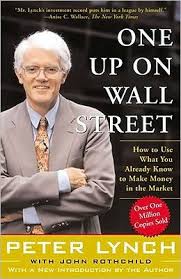
I looked back and reviewed my notes on one of the all-time investing classics, One Up on Wall Street by Peter Lynch. Nobody managing money, not even Warren Buffett in his heyday, had a better track record than the storied manager of the Magellan Fund. Peter Lynch built Fidelity into the powerhouse that it is today. So maybe his investment wisdom from this 1989 classic has some merit 30 years later. The highlights are as follows:
Before you think about buying stocks, you ought to have made some basic decisions about the market, about how much you trust corporate America, about whether you need to invest in stocks and what you expect to get out of them, about whether you are a short or long-term investor, and about how you will react to sudden, unexpected, and severe drops in price. It’s best to define your objectives and clarify your attitudes beforehand, because if you are undecided and lack conviction, then you are a potential market victim, who abandons all hope and reason at the worst moment and sells out at a loss. It is personal preparation, as much as knowledge and research, that distinguishes the successful stockpicker from the chronic loser. Ultimately it is not the stock market, not even the companies themselves that determine an investor’s fate. It is the investor. It’s about conviction in investing
Things Lynch found attractive in a company:
1. It sounds dull-or even better, ridiculous.
2. It does something dull.
3. It does something disagreeable.
4. It’s a spinoff.
5. The institution doesn’t own it, and the analysts don’t follow it.
6. The rumors abound: it’s involved with toxic waste dumping and/or the mafia.
7. There’s something depressing about it
8. It’s a no-growth industry.
9. It’s got a niche.
10. People have to keep buying it.
11. It’s a user of technology.
12. The insiders are buyers.
13. The company is buying back shares.
What follows is a summary of the things you’d like to learn about stocks in each of the six categories:
• The P/c ratio. Is it high or low for this particular company and for similar companies in the same industry.
• The percentage of institutional ownership. The lower the better.
• Whether insiders are buying and whether the company itself is buying back its own shares. Both are positive signs.
• The record of earnings growth to date and whether the earnings are sporadic or consistent.
• Whether the company has a strong balance sheet or a weak balance sheet (debt-to-equity ratio) and how it’s rated for financial strength.
• The cash position. With $16 in net cash, I know Ford is unlikely to drop below $16 a share. That’s the floor on the stock.
Last but not least, if you don’t have an appetite or love for this kind of thing, buy a mutual fund or an index fund
1 Comment
Add comment Cancel reply
You must be logged in to post a comment.

This is a test email